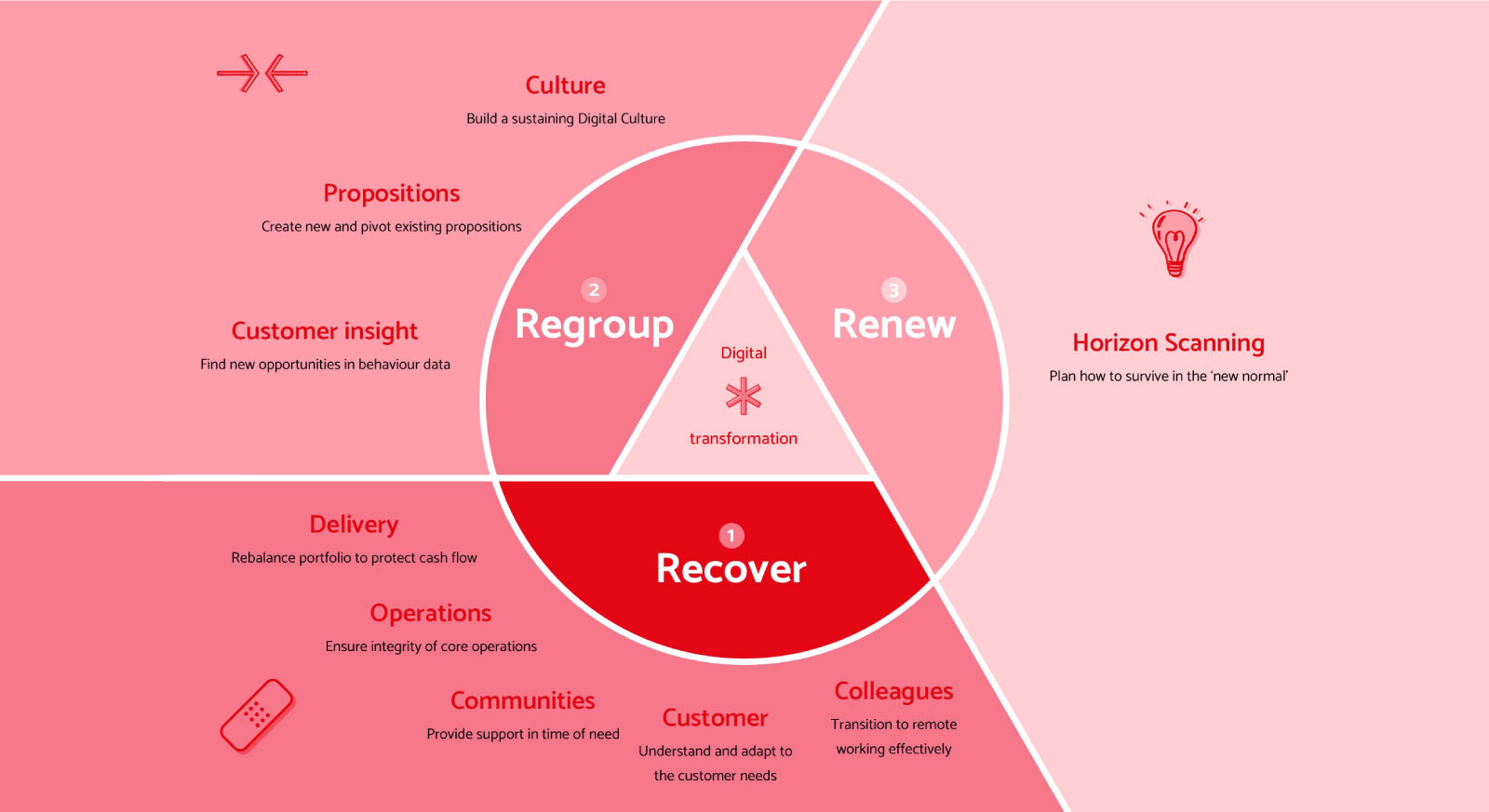As Covid-19 continues to upend BAU we need to balance longer-term strategic responses with keeping the lights on in the immediate term.
It is without a doubt Covid-19 is drastically reshaping how we live and work. As a result of the immediate and long-term adjustments being made in response to the virus’ effect on health systems, the economy and working patterns, we are entering a ‘new normal’ that will look significantly different from where we are today.
Whether they know it or not, all organisations are now undertaking a digital transformation journey, however not by choice. Mandatory instructions to work from home where possible, now in force in many countries across the globe, are stress testing organisations digital maturity and ability to maintain core business operations with either a full or partially remote workforce.
Up until now, firms have been working hard to set up crisis management teams and procedures to get a handle on the immediate impact, but it is the medium and long-term responses that will have a lasting effect on an organisation’s culture, stability and ultimately longevity. In this vein, firms should seek to reframe these unusual times as an opportunity to seek alternative and perhaps non-traditional ways to deliver value to customers as new social norms, behaviours and preferences start to take root. What is clear thus far is that the pace at which businesses can react and adapt to new customer behaviours will be one of the key determinants for surviving this turbulence.
Managing multiple time frames in approaching crisis response
Outlined below is a three-part approach that can help business leaders to delicately balance the pressing needs of today while also keeping an eye on the future.
The three lenses cover: Recover, Regroup, Renew.
- Recover: Keep the lights on during immediate crisis response
- Regroup: Refresh your digital culture and pivot customer propositions
- Renew: Seek out new opportunities as we prepare for life in the ‘new normal’.
Most organisations will progress through the three phases in a linear fashion, however, this will largely be influenced by the following factors: industry, size of the organisation, financial liquidity, geographic footprint, to name a few.
Once initial financial and operational stability has been achieved in the ‘Recover’ phase, this will free up capacity to consider the two subsequent phases. At this point, we advocate taking a balanced approach to managing for the mid to long-term future as a way to drive future growth.
Phase 1: Recover – keep the lights on during immediate crisis response
What is unique about this global crisis, is that it is having a dual impact on both the demand and supply-side of most businesses. This means that, in their initial response, firms need to give equal emphasis to stabilising operations at the same time as protecting the core business and established revenue streams.
Timeframe: Now
Core Objectives:
- Ensure employees are safe in existing or remote working environments
- Understand and adapt to immediate customer needs as they too are impacted by Covid-19
- Maintain integrity of core operations as the workforce switches to remote working
- Rebalance delivery portfolio to focus on business-critical activities and stymie unnecessary cashflow
- Pivot propositions to support communities in times of need.
Phase 2: Regroup – refresh your Digital culture and pivot customer propositions
The words of Peter Drucker - ‘culture eats strategy for breakfast’ - have never been more pertinent than now. With all organisations undergoing a mandatory digital transformation, the Regroup phase is about investing in our culture to build a healthy human system that will sustain the business during turbulent times. Exercising empathy for others and being mindful of what our colleagues ‘new normal’ means for them and their working patterns is crucial as we are all settling into new routines and conditions. This phase also focuses on reassessing how we can ‘level up’ propositions so to continue delivering value to customers as they too readjust to the ‘new normal’. The art of ‘being human’ in a digital environment is of paramount importance in this phase as employees and customers become the core focus of delivering value.
Timeframe: 6–12 month horizon
Core Objectives:
- Establish a digital culture that equips employees with the right beliefs, behaviours and mindsets to thrive in a new context
- Identify and experiment with new ways to adapt products and services to reflect evolving needs of customers.
Phase 3: Renew – seek out new opportunities as we prepare for life in the ‘new normal’
We are living in the ‘eye of the storm’ of a crisis that will fundamentally reshape the world as we know it today. No one knows what the ‘new normal’ is going to look like for sure, but one thing we can count on is that there will be sustained changes to working patterns, economic stability and consumer behaviours. This is already and will continue to threaten existing revenue streams and traditional business models.
As firms look to make a play in the future they will need to challenge orthodoxies and re-examine long-held beliefs about who their customers are, the structure and competitiveness of their market, the integrity of their distribution model, and the value they deliver to customers. Navigating the uncertainty that lies ahead is at the heart of the third phase. What we have learnt over the past 12 years since the last global crisis is that a firm’s ability to pivot and evolve is underpinned by a new mindset characterised by customer centricity, flexibility, rapid decision making and an experimental approach to finding and capturing value.
Timeframe: 9 months
Core Objectives:
- Understand the reality of where we are today
- Systematically monitor macro forces that have the potential to create new and threaten existing market opportunities
- Define scenarios and related options for how you might play in the ‘new normal’
- Define and execute experiments to gather more empirical evidence on certain choices.
Move quickly and make things
This crisis is causing firms across the globe to reset and rethink many parts of their business, all at the same time. Most organisations have not, and most likely will not face another catalyst for change of this magnitude or scale again. The 3R model above introduces a multi-disciplined and structured approach for how organisations can navigate the turbulence in the short term while also seeking to find new opportunities on horizons that lie further ahead. Our lens on reality is changing on a regular basis as the outbreak spreads across the globe, and as new information comes to light. Our path to recovery is uncertain but we believe the firms that pair a creative problem-solving approach with the ability to diagnose and course-correct at pace will be triumphant as this climate favours those that have a bias towards action and speed rather than perfection.



